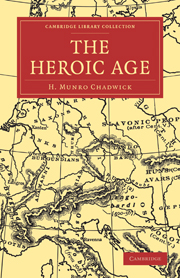Book contents
- Frontmatter
- PREFACE
- Contents
- DEDICATION
- CHAPTER I THE EARLY NARRATIVE POETRY OF THE TEUTONIC PEOPLES
- CHAPTER II THE HEROIC AGE OF THE TEUTONIC PEOPLES
- CHAPTER III SCENE AND NATIONALITY IN THE HEROIC STORIES
- CHAPTER IV THE ORIGIN AND HISTORY OF THE HEROIC POEMS
- CHAPTER V THE POETRY AND MINSTRELSY OF EARLY TIMES
- CHAPTER VI SUPERNATURAL ELEMENTS IN THE HEROIC STORIES
- CHAPTER VII MYTHICAL ELEMENTS IN THE HEROIC POEMS
- CHAPTER VIII THE USE OF FICTION IN THE HEROIC POEMS
- CHAPTER IX THE HEROIC AGE OF GREECE
- CHAPTER X THE HOMERIC POEMS
- CHAPTER XI EARLY GREEK POETRY AND MINSTRELSY
- CHAPTER XII SUPERNATURAL ELEMENTS IN THE HOMERIC POEMS
- CHAPTER XIII MYTH IN THE HOMERIC POEMS
- CHAPTER XIV FICTION IN THE HOMERIC POEMS
- CHAPTER XV THE COMMON CHARACTERISTICS OF TEUTONIC AND GREEK HEROIC POETRY
- CHAPTER XVI SOCIETY IN THE HEROIC AGE
- CHAPTER XVII GOVERNMENT IN THE HEROIC AGE
- CHAPTER XVIII RELIGION IN THE HEROIC AGE
- CHAPTER XIX THE CAUSES AND ANTECEDENT CONDITIONS OF THE HEROIC AGE
- ADDENDA ET CORRIGENDA
- INDEX
- Plate section
CHAPTER VIII - THE USE OF FICTION IN THE HEROIC POEMS
Published online by Cambridge University Press: 07 September 2011
- Frontmatter
- PREFACE
- Contents
- DEDICATION
- CHAPTER I THE EARLY NARRATIVE POETRY OF THE TEUTONIC PEOPLES
- CHAPTER II THE HEROIC AGE OF THE TEUTONIC PEOPLES
- CHAPTER III SCENE AND NATIONALITY IN THE HEROIC STORIES
- CHAPTER IV THE ORIGIN AND HISTORY OF THE HEROIC POEMS
- CHAPTER V THE POETRY AND MINSTRELSY OF EARLY TIMES
- CHAPTER VI SUPERNATURAL ELEMENTS IN THE HEROIC STORIES
- CHAPTER VII MYTHICAL ELEMENTS IN THE HEROIC POEMS
- CHAPTER VIII THE USE OF FICTION IN THE HEROIC POEMS
- CHAPTER IX THE HEROIC AGE OF GREECE
- CHAPTER X THE HOMERIC POEMS
- CHAPTER XI EARLY GREEK POETRY AND MINSTRELSY
- CHAPTER XII SUPERNATURAL ELEMENTS IN THE HOMERIC POEMS
- CHAPTER XIII MYTH IN THE HOMERIC POEMS
- CHAPTER XIV FICTION IN THE HOMERIC POEMS
- CHAPTER XV THE COMMON CHARACTERISTICS OF TEUTONIC AND GREEK HEROIC POETRY
- CHAPTER XVI SOCIETY IN THE HEROIC AGE
- CHAPTER XVII GOVERNMENT IN THE HEROIC AGE
- CHAPTER XVIII RELIGION IN THE HEROIC AGE
- CHAPTER XIX THE CAUSES AND ANTECEDENT CONDITIONS OF THE HEROIC AGE
- ADDENDA ET CORRIGENDA
- INDEX
- Plate section
Summary
The question how far the use of fiction was permitted in heroic poetry is of course one to which we cannot possibly hope to give a definite answer. All poetry which deserves the name claims to do something more than provide a bare record of facts. According to the ancient definition its proper function is to express the universal rather than the particular–what may happen or may have happened rather than what has happened. Some freedom of play for the imagination is therefore essential. These remarks hold good for early Teutonic poetry just as much as for Greek. If we could recover the poems recited in Attila's presence (cf. p. 84) we should doubtless find that they contained far more than a mere statement of facts. In the works which have come down to us however the degree to which freedom is allowed to the imagination varies very greatly from case to case. Thus in the poem on the battle of Brunanburh it is restricted within comparatively narrow limits, while in the almost contemporaneous Hákonarmál the historical fact on which the poem is based is very largely obscured by a wholly fictitious narrative. We may naturally expect that the authors of heroic poems likewise differed in the treatment of their subjects, though not necessarily to the same degree.
As an instance of a poem which obviously contains a large amount of fiction we can hardly do better than take the Anglo-Saxon Widsith.
- Type
- Chapter
- Information
- The Heroic Age , pp. 151 - 167Publisher: Cambridge University PressPrint publication year: 2010First published in: 1912



